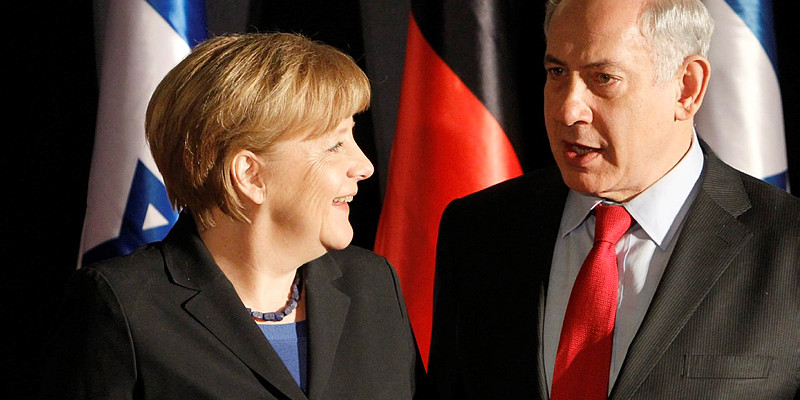Nuclear talks between the West and Iran and the U.S.-brokered negotiations between Israel and the Palestinian Authority are “the two diplomatic issues of the highest order,” Israeli Prime Minister Benjamin Netanyahu asserted Sunday morning in advance of German Chancellor Angela Merkel’s arrival in Jerusalem.
At the weekly cabinet session on Sunday morning, Israeli Prime Minister Benjamin Netanyahu stated his concerns regarding Iran’s continued nuclear enrichment and the seeming failure of the deal made in November between the Six Global Powers and the Islamic Republic to halt the process.
German Chancellor Angela Merkel is due to arrive in Israel on Monday.
Iran “is receiving everything and giving almost nothing,” Netanyahu stated.
The Israeli leader named the “two diplomatic issues of the highest order” that he plans to discuss with Merkel in efforts to deepen bilateral cooperation: the current negotiations with the Palestinians and Iran’s nuclear enrichment.
The Iranian program continues notwithstanding the deal made between the Six Global Powers and Iran in November – with a stated objective to reach a full agreement within a year – in which Tehran was given $7 billion in sanctions relief in exchange for taking steps to slow down its nuclear program. Netanyahu had warned that it was a “very bad deal.”
NUCLEAR TALKS HAVE NOT SUCCEEDED IN RESTRAINING TEHRAN
“Since Germany is part of the P5+1 [United States, Russia, China, United Kingdom and France – the five permanent members of the UN Security Council – plus Germany], I view with concern that fact that Iran believes that it will realize its plan to be a nuclear threshold state, with an enrichment capacity that it thinks cannot be touched, with the ability to develop both nuclear weapons and inter-continental missiles, which it is continuing to work on unhindered,” Netanyahu said.
“This combination of enrichment, weapons and launch capabilities, says that Iran is, in effect, receiving everything and giving almost nothing,” the Israeli leader declared. “This is the current situation. The permanent agreement cannot render this situation permanent. It must dismantle the Iranian ability to either produce or launch nuclear weapons, and this has yet to be achieved, and without the insistence of the major powers it will not be achieved. I hope that Germany and the other P5+1 countries will insist on the genuine demands to prevent Iran from becoming a nuclear threshold state.”
US Undersecretary of State for Political Affairs Wendy Sherman, in Israel over the weekend, stressed the goal of the Obama administration to reach an agreement with Iran by July 20, adding that the differences between Washington and Jerusalem on the issue are based on “different viewpoints” concerning “tactics” and not the common results that they seek to achieve.
Until recently, Gary Samore was the top expert in Washington on weapons of mass destruction and the Iranian nuclear program. In a Bloomberg interview last week, Samore opined that the Iranians are not negotiating in good faith and have no intention to dismantle their quest for nuclear weapons, adding that the current negotiations have practically no chance of success.
Author: Atara Beck, Staff Writer, United with Israel
Date: Feb. 23, 2014
